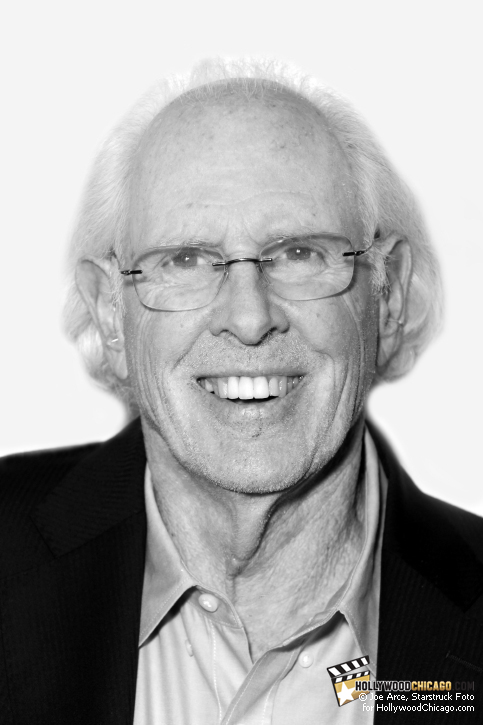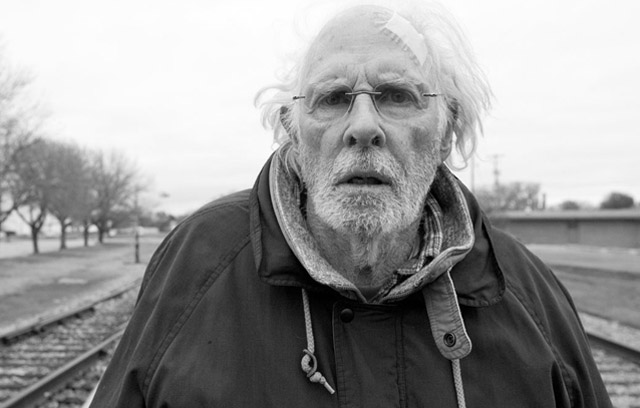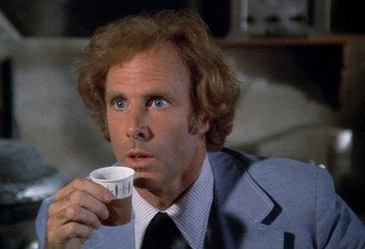CHICAGO – In anticipation of the scariest week of the year, HollywoodChicago.com launches its 2024 Movie Gifts series, which will suggest DVDs and collections for holiday giving.
Interview: Tapping Bruce Dern for His New FIlm ‘Nebraska’
CHICAGO – Veteran actor Bruce Dern is now up to bat. That is how he describes what is at stake in his role as Woody in director Alexander Payne’s new film, “Nebraska.” But this film icon – with an over 50 year career – also has plenty other stories to offer, regarding Jack Nicholson, his family, his life and performing a “Derns-ser.”
Bruce Dern began his on-screen career in TV beginning in 1960, taking various character parts during that era, with regular cowboy roles in “Wagon Train,” “The Virginian” and “The Big Valley.” He made his film debut in the horror classic “Hush, Hush Sweet Charlotte” (1964), and created memorable characters in such diverse films as “They Shoot Horses, Don’t They” (1969), “Drive, He Said” (1971), “The Great Gatsby” (1974), “Smile” (1975) and “Family Plot” (1976). Recent films include roles in “Monster” (2003), “The Astronaut Farmer” (2006) and as Frank Harlow in the HBO series “Big Love” (2006-11). He was nominated for an Oscar for Best Supporting Actor in “Coming Home” (1978).
 Photo credit: Joe Arce of Starstruck Foto for HollywoodChicago.com |
Dern has Chicago roots, having been born here. His grandfather was George Henry Dern, governor of Utah. His great uncle was famous poet Archibald MacLeish, and because of the family’s political roots, he knew both Eleanor Roosevelt and 1950s presidential candidate Adlai Stevenson, who was his godfather. He formerly was married to actress Diane Ladd, his daughter from that marriage is actress Laura Dern.
His latest turn is in Alexander Payne’s “Nebraska” is a part that took ten years to get to the screen. He is the focus as an elderly man named Woody who believes he has won a Publisher’s-Clearing-House type sweepstakes, and will not rest until he goes to Nebraska to claim his prize. Along the way he faces his past in his old hometown, and wrestles with his younger son (Will Forte) and his own obstinate ways.
HollywoodChicago.com was part of roundtable interview that consisted of an incredible Bruce Dern monologue for 25 minutes. To compartmentalize his commentary, his anecdotes will be separated with questions that might have been asked to elicit his stream of consciousness thoughts and stories.
HollywoodChicago.com: In ‘Nebraska,’ you play a dead-end, possibly dementia-stricken man who seems to be going through his last hurrah. Did you have something in your own life experience that you were able to draw from?
Bruce Dern: Woody has one principle, if there is anything left. If Woody were Wrigley Field, all the lights in right field are out, so he has to play with right-center, center, left and still get the game in. He misses stuff – but I don’t know if that is dementia, because I am not there, and don’t know if it is Alzheimer’s, because I am not there. I think that he is a fair man and he believes in fairness. Therefore, he believes what people say to him and doesn’t understand why people wouldn’t tell the truth to him.
The hardest battle that Alexander had, besides me being allowed to do the part, was making it in black-and-white. It took a decade – it was ten years ago last month that I first saw the material. The exciting thing was that Alexander Payne chose me. I’ve been cast well in movies and I can’t complain, and I made some bucks, but I have never had what I would call an at-bat role. This part is the biggest ‘at-bat’ of my career, and there are two out. And if I don’t get on base, everything is over.
HollywoodChicago.com: How did you separate yourself from everyone else who auditioned for Woody?
Dern: When I first read it, I went to Toys R Us the next morning, and bought Alexander a little red truck. I then went to his office to make sure that he got it and that some secretary didn’t trash it or something like that. On the truck, it said ‘I think I am Woody.’ He’ll tell you what he later told me – ‘Bruce, I have seen every 70-year-old who has ever been paid a dime to act and even some who have never been paid…[and] I am going to give myself a compliment.’ When I asked him what that was, he replied, ‘When I first saw the material, I had you in mind.’
On the first day, he also said ‘I’m your director and this is Phedon Papamichael, your cinematographer. Do us a favor and reach for something that I am not sure that you have ever done. Don’t show us anything, just let us find it.’ You just have to pick a guy up and hug him, because I believed him.
 Photo credit: Paramount Vantage |
HollywoodChicago.com: Was there any other directors in your long career that was comparable to working with Alexander Payne?
Dern: It was about being excited to go to work. I had that in my stage work with Elia Kazan [‘Sweet Bird of Youth’], and in working with Alfred Hitchcock [‘Marnie,’ ‘Family Plot’]. With Alexander, it was the same. It was like working with Douglas Trumbull [‘Silent Running, 1972], because they were magicians.
Steven Spielberg once asked me, ‘What is it that you see in Douglas?’ And I said, ‘What he sees through the eyepiece.’ He quickly said, ‘I look through the eyepiece. All of us do and we are all pretty good at it.’ I countered with, ‘Yeah, but you don’t see what he sees.’ And Steven asked, ‘What is that?’ I simply said, ‘He sees magic.’
HollywoodChicago.com: What were some of the other obstacles to making the film, that took those ten years to finally get the green light?
Dern: There was also something about the area. I heard one studio guy say ‘Nebraska, isn’t that out in the netherworld?’ Give me a f**king break. The excitement about being these people and being around these people is that it is bleak. It is black and white, but they don’t leave. They don’t leave because it’s a monument, their monument. Their forebears built it, and even though International Harvester or whoever now owns the farms their family owned, they stayed and worked the farms as tenants. They worked their own family’s old property for somebody else. That’s why Woody can never remember what he wanted to be, all that sh*t he just dismissed, but he survived it.
HollywoodChicago.com: You’ve had a long relationship with Jack Nicholson, going back into your early days on TV in the 1960s, those early motorcycle and psychedelic films, and finally he directed you in ‘Drive, He Said’ in the early 1970s. Do you still have a relationship with Nicholson?
Dern: Jack loved the movie after he saw it, and is hosting a screening when we get back to Los Angeles. Jack, as a director, had something in common with other guys I’ve worked with – like Hitchcock, Trumbull, Francis Ford Coppola, Hal Ashby, Michael Ritchie and John Frankenheimer – they’ve all got game.
Jack Nicholson was as good as a director as any of them. He gave me the best piece of direction ever in my career. I was doing ‘Drive, He Said,’ and I was supposed to be frustrated with the basketball player I’m coaching. We’re having a practice in the scene, I can’t through to the player, and I don’t know what to do – I didn’t know how to act the scene. And Jack said, ‘Derns, it’s absolute f**king frustration, what do you do?’ I said, ‘I don’t know, I’ve already yelled at him’ Jack just replied, ‘Well, maybe you come up with a ‘Derns-ser.’ That was his name for the little things I put into various characters in my career, especially when we had done the biker and dope films. [laughs]
HollywoodChicago.com: What did you end up doing?
Dern: Jack thought part of my frustration was my anger. He said, ‘walk away from the player, and do this.’ [Dern demonstrates a ‘Derns-ser’]. It was just about that. I told him if we do this, we’re going to get in trouble, because this is what folks do in real life. And Jack, he was on to it, and I was just learning to get on to it. And we repeated that reality again two years later, when we did ‘King of Marvin Gardens,’ directed by ‘Curly Bob’ [Rafelson]. And Curly Bob was another director name I left out. He’s a pretty f**king good filmmaker.
HollywoodChicago.com: What story about Jack do you think best represents him?
Dern: Jeremy Larner, the guy who wrote ‘Drive, He Said,’ had the greatest trivia about himself. He told me first, but before I told Jack, Jack said to him [Dern imitates Nicholson’s voice] ‘Listen, asshole, what do you have about you that’s so special? You’re just a writer from Ohio or some f**king place.’ I convinced Jack he had great trivia – better than anyone we know – because Jack admires people who have done big stuff like I do. Jack finally said ‘What’s his f**king trivia?” I told him that Jeremy had two roommates at the University of Cincinnati during his freshman year – Oscar Robertson and Sandy Koufax. So Jack shoots back ‘Yeah, great. Who cares about that trivia sh*t – I’m from Asbury Park!’ [laughs]
HollywoodChicago.com: You have financial, political and cultural cache from your relatives. What stories illustrate your upbringing with these folks?
 Bruce Dern in ‘Family Plot’ (1976) Photo credit: Universal Studios Home Entertainment |
Dern: I have roots in the Chicago area. My mother’s family, the MacLeishes, owned part of Carson Pirie Scott for 117 years until we sold it recently. MacLeish is my middle name. My grandfather’s brother – my mother’s uncle – was Archibald MacLeish [a Pulitzer Prize winning poet]. So it was the Carsons, the Piries, the Scotts and the MacLeishes. We sold it to Bergners 12 years ago, and they kept the Carson Pirie Scott name.
My father’s law partner, who we called Uncle all the time, was Adlai Stevenson, who ran for president twice, and he said a great thing to me one time when he came to see ‘Sweet Bird of Youth’ in 1959. The Kennedys were leaning on him pretty heavy right then and I asked ‘What is all this stuff?’ He said, ‘They think I am the lion of the party but the party doesn’t need a lion. They should just leave it alone because it works pretty well by itself. it shouldn’t be dominated by people who think that we should have a king. We don’t need a king because it doesn’t work.’
I asked, ‘What happened to you?’ He said, ‘Well, in 1952 when I came in, I came in on a horse that I thought was pretty white, but when I came back in 1956, that horse had gotten a lot grayer.’ He reached across the table, grabbed my wrist and said ‘I want you to make me a promise that you will never vote for that office until you see that somebody on a white horse.’ I never have seen that, and I have never voted.
HollywoodChicago.com: Didn’t your Dad’s father have a prominent role in Franklin Roosevelt’s administration?
Dern: My grandfather George Dern was Utah’s first non-Mormon governor, served for eight years, and then he became Roosevelt’s Secretary of War, which is why he left Utah. I think the reason he got that cabinet post is because he chaired the 1928 Democratic National Convention in Utah, Roosevelt was impressed with him, and remembered him when he was elected in 1932. The administration wanted a westerner in the cabinet, and George had served in the army, so it was all good. [laughs]
HollywoodChicago.com: You had a role in director Quentin Tarantino’s ‘Django Unchained.’ How did you hook up with him?
Dern: I never had met Quentin, until two years ago. He just wanted to meet me. So we had lunch and talked for six hours, from four in the afternoon until ten at night. Quentin is a movie buff, trust me, and I’m pretty good at movie trivia, but Quentin is the best. In Los Angeles, there is a big premiere thing that the American Film Institute is putting on, as the opening for ‘Nebraska,’ and they are giving me their Lifetime Achievement Award. Quentin is giving it to me, so that’s nice.
I’ve only been in one remake in my career [‘The Great Gatsby’]. When I told this to Quentin, he really laughed. He told me that together we should do ‘Grindhouse II,’ and we should do some sh*t, because he’s up to sh*t, and I’m up to sh*t.
HollywoodChicago.com: Finally, do you have a philosophy you live by, either as an actor or a person?
Dern: My Uncle Archie [MacLeish] made one great quote, that I’ve used my whole career, and I’ve hopefully pulled it off. And that was in reply to a question that a wag asked him at the Library of Congress [MacLeish was a Librarian of Congress], when he brought Ezra Pound there. The reporter asked him, ‘What do your poems mean, Mr. MacLeish?’ And Archie replied, ‘Hey bud, the poem must not mean, it must be.’ At some point I got tired of meaning, so now I just be.
 | By PATRICK McDONALD |


